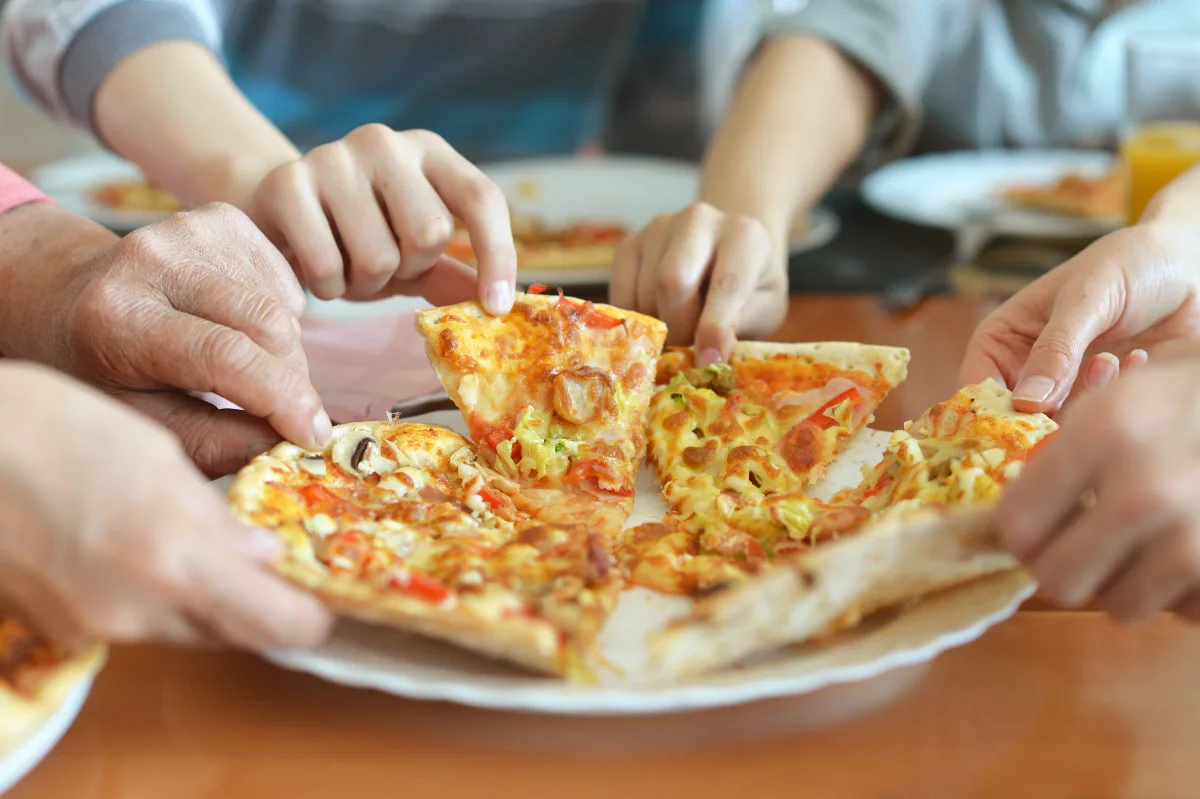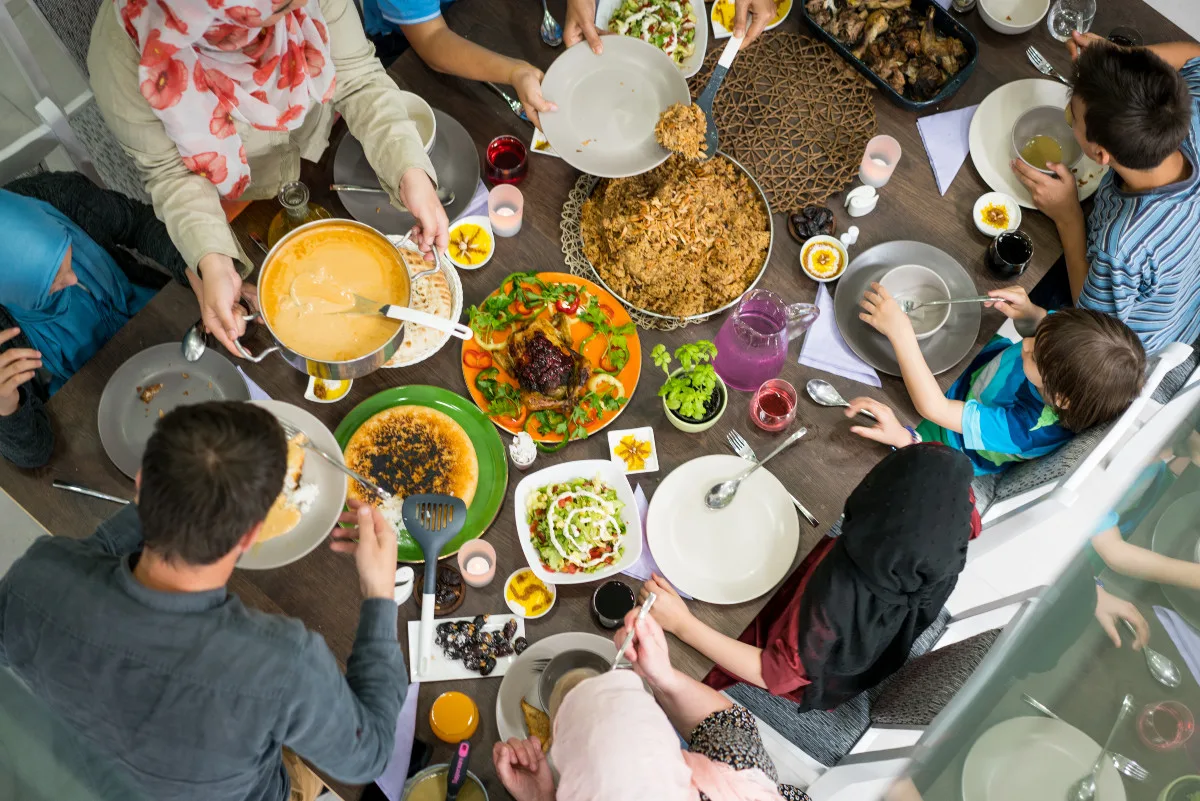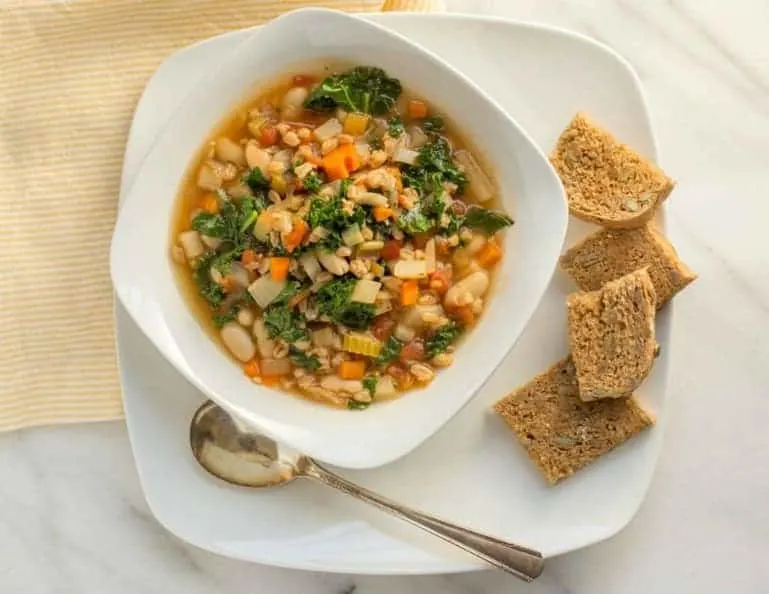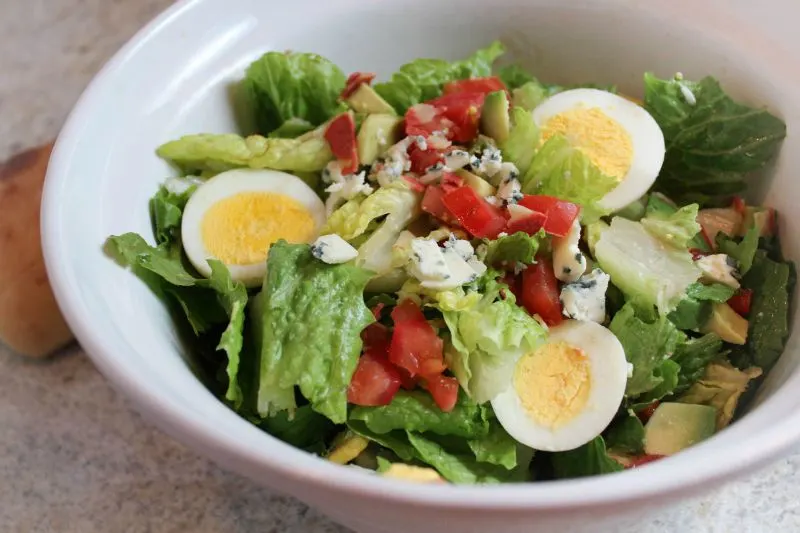Each January, traffic to The Scramble’s website explodes. As a small business owner, it’s an exciting time to run a food blog and meal planning service and I welcome all of the new folks who join us during this period. But as a proponent of rejecting diet culture and building a positive and joyful relationship with cooking and food, it also makes me sad that so many people feel an intense need to “fix” their diets each January.

The truth is that while food has been a source of anxiety and judgment in our culture for generations, in the past 30 years the rules, negative attitudes, and perceived connection between morality and eating has exploded.
This perspective is so pernicious that for many, food is no longer a thing of pleasure or enjoyment, but rather an arena for restriction, deprivation, and control. We worry whether our food is “real,” organic, homemade, dye-free, sugar-free, whole grain, processed. Restrictive dietary theories are adopted as gospel. And the feelings of failure for not being “disciplined” enough build and ruminate. It’s enough to make anyone crazy — no wonder so many people struggle with deciding what to make for dinner!
So, I thought it might be helpful to share four ideas that helped me to reject diet culture, let go of the shame, and learn to love food again (and have helped clients I have worked with over the years to do the same). In doing so, my hope is that instead of attempting an unsustainable diet which can then lead to a cycle of deprivation, binging, and guilt, perhaps you’ll start to look at food a little differently.

Everyone Is Different
While studying for my health coaching certificate at the Institute for Integrative Nutrition, we learned about many different dietary theories, but the concept that resonated most with me and the one that helped me to reject diet culture for myself was that of bioindividuality.
Bioindividuality
Bioindividuality is the idea that each person has their own unique genetic and environmental make-up that will impact how their body responds to different foods. This can be influenced by the foods your ancestors ate over generations, the types of foods you were exposed to throughout your life, external environmental factors, health challenges (and strengths) you have, the messaging you received as a kid about food, diet, and your body, and so much more.
What this means is that while some diets, eating styles, or specific foods may work really well for one person, they might not have the same impact on another, not because of any one person’s failing, but because each person is just different.
Learning about bioindividuality was a revelation for me. It gave me permission to start to pay attention to what my body was telling me, rather than focusing on the external messages about food and diet that bombard us constantly.

Listen to Your Body
We have been so trained to give credence to external messaging about our bodies and what we put into them, that learning that there isn’t a prescribed diet out there that will definitely work can feel pretty scary. For me, the step that empowered me to reject diet culture was learning to listen to my body.
I know that sounds like a cop out, but it’s the truth. The best way to find out what your body needs is to pay attention to it and then figure out what is going to work best for you. To do this, you will want to try to focus in on how your body responds to different foods at different times.
You can do this mentally, or you can jot down what you notice in a little notebook or in a food journal. Important note: this is NOT to track how much you eat, count calories, or cause guilt or shame. Instead, I encourage you to approach the journal with curiosity and the intention of learning to listen to the messages your body is sending.
Here are some ways to start to get to know your body and how it responds to what you put into it:
Before a meal, pay attention to what you are craving: crunchy/soft, salty/sweet/spicy, protein, fruit, vegetables, dairy, carbohydrates.
Immediately after a meal, pay attention to how you feel: tired/energized, satisfied/still hungry, bloated/comfortable, focused/distracted, etc. Also, ask yourself: did you honor what your body was telling you when you chose your meal? If so, how does it feel now? Are you satisfied? If not, how does it feel now? Did your alternative choice fulfill you?
An hour or two after a meal, pay attention to how you feel: tired/energized, still satisfied/ hungry again, bloated/comfortable, focused/distracted, etc.
As you pay attention, you’ll start to notice that different foods impact you in various ways (sometimes differently at certain times of day). You can then use this information to figure out what foods serve your body best in various situations.

All Food Serves a Purpose
The moral judgments that we put on food are deep and profound. Just think about the terms we use to describe the foods we eat: junk, healthy, good, bad, etc. And while it is undeniable that there are foods that offer more nutrients and foods that offer fewer, I truly believe that all foods serve a purpose.
Take chips, for example, it is true that they can contain a good deal of sodium and fat, but they are also satisfying to eat and a quick and easy snack food. So, while it might not be ideal to have a daily meal that consists only of chips, enjoying them for what they are and what they can offer is absolutely worthwhile.
Furthermore, when we restrict foods that we enjoy, we are putting ourselves into a deprivation mindset that not only leaves us feeling unfulfilled and frustrated, but also sets us up for “falling off the wagon” or “cheating,” which can then lead to guilt, shame, and self-loathing, none of which is good for our bodies either.
So, instead, I try to think about foods in terms of the gifts they are giving me. It could be physical nourishment, emotional satisfaction, taking care of hunger, quick energy, an opportunity to share with others, satisfying a craving, etc. And then, when I eat that food, I can be more relaxed and less judgmental of myself for eating it.
It took a while, but one thing I have noticed since making this shift in myself (and I have heard the same from coaching clients), is that by taking the judgment and shame out of eating “junk” foods, I have become much more relaxed about both eating and not eating them. My desire to cram as much of them down my throat as I can when I have the chance has disappeared. This is because I have learned to stop the deprivation, binge, and shame cycle, which means I can calmly enjoy as much or as little as I want when I want. It is incredibly liberating!

Food Should Taste Good
As I said before, there is no denying that certain foods offer more physical nourishment than others. And, in order to be as healthy as we can be, it is important to incorporate as many of those foods into our diets as we can. But doing this out of a sense of obligation is never going to be as successful as if we actually enjoy eating these nourishing foods. Luckily, there is a relatively simple solution that helps us to reject diet culture and enjoy our meals more: we make sure the food tastes good.
Don’t Eat Foods You Hate
If there is a more nourishing food that you really don’t enjoy, don’t eat it! If kale makes you gag, eggs turn you off, or beans just don’t work for your digestive system, then you should not feel any guilt about not eating them. Eating should never feel like a punishment. And there are so many wonderful, delicious nourishing foods out there, there’s no need to choke anything down.
Try Different Cooking Styles
Before you throw in the towel on any certain food, though, I encourage you to try different preparation methods to see if you can find a way to enjoy it.
For vegetables, for instance, roasting them will bring out the natural sugars and can make them much more palatable. Similarly, if you are someone who tends to steam your veggies, consider adding some seasoning after they are cooked to add more interest. Some of my favorite seasonings for vegetables include: Parmesan cheese, lemon zest, lemon pepper seasoning, garlic powder, hot sauces, and butter and salt.
If you need ideas for tasty ways to serve lots of nourishing foods, make sure to check out our recipes as well as our content on flavor building and cooking specific fruits and vegetables.

Add, Don’t Subtract
And finally, while it may seem counter-intuitive, especially if you are hoping to lose weight, instead of focusing on what foods you need to restrict, giving your attention to the foods you want to add in that will leave your body feeling its best can be incredibly effective. This is because it encourages a positive mindset around food and eating, rather than a negative (deprivation) one, which will encourage success rather than shame and guilt.
Rejecting diet culture is not easy. It is, quite honestly, a subversive act that pushes back against all that we have been taught about how we should think about food, eating, and our bodies. But by reconnecting with our bodies, honoring what it is we need and want, and enjoying the food we eat, we are opening ourselves up for so much more joy and freeing up all of that energy we spent on restriction and deprivation for better, more positive things.
